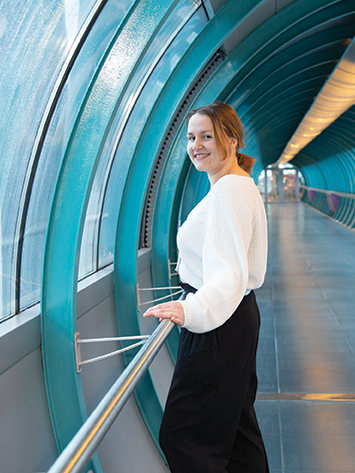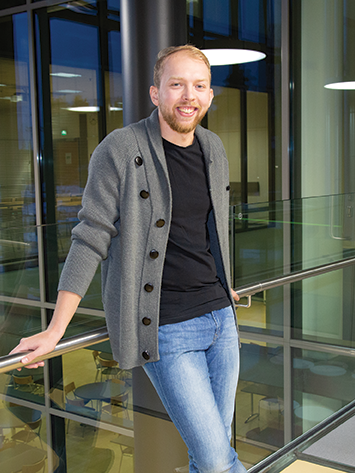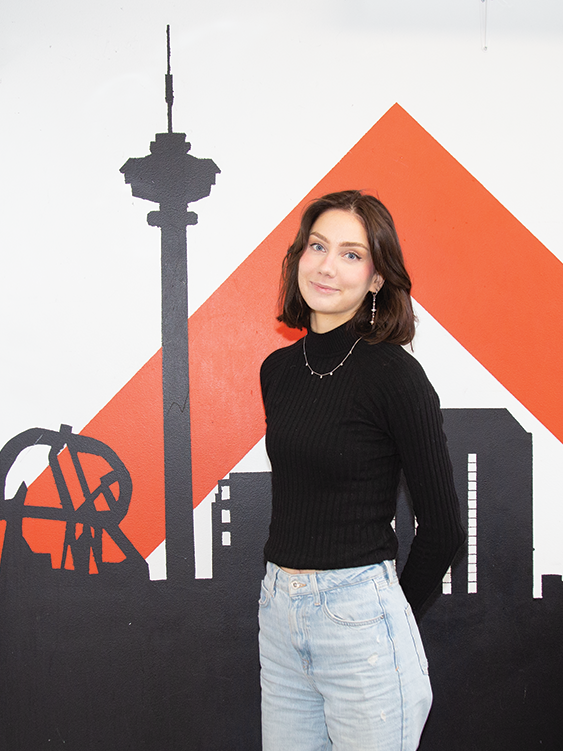In English: The road to university isn’t always linear – Three students tell us their story
Three students of Tampere University tell us about the road they took to get here. It’s not always a direct path.
Original text and photos: Miira Parhiala – Translation: Emma Brown

Changed for the better
When Pirita Ollila graduated from high school (fin. lukio) in 2018, she really wanted to go to university – not necessarily to study any particular degree, just to get into university.
“My first year, I applied to study Political Science at the University of Turku and didn’t get in. That entrance exam was quite the wake-up call. It was a completely different exam than I was used to in high school.”
The following year, Ollila counted the points on her baccalaureate and noticed that she could probably get into the University of Vaasa to study Administrative Science.
“I didn’t really have an interest in administrative science, let alone have an understanding of what it is. My points were enough to get me in, and that felt most important at the time.”
Ollila wanted to be sure. She decided to attend the entrance exam as well and participated in a prep course for it.
“I could barely study for the exam. It was so boring. Thinking back, that should have been a clear sign that administrative science is not my thing.”
University of Vaasa opened its doors to Ollila in 2019. However, nothing really came of her studies, and she continuously felt that she’s not in the right place.
Studying in the wrong field had its effects on Ollila’s life and how she viewed herself. Severe anxiety and unsureness of the future were constantly weighed on her, and she never really felt at ease.
“Studying and professionalism are big parts of my identity. That’s why gap years and studying in the wrong field brought up a lot of difficult emotions. I couldn’t fulfil what I felt was most important to me in my life.”
Instead of continuing in administrative studies, Ollila decided to work for a year.
“I thought about what I really wanted from life. At the same time, I completed courses in social science through the open university. I was truly interested in those.”
Especially political science and international politics piqued her interest. Ollila found the political research programme at Tampere University. For the first time, she felt like she had found her field.
“I scrolled through the courses on political research on the Tampere University website and kept getting more and more excited. At the same time, I was afraid that, since I was no longer a first-time applicant, I would never get into another university.”
Ollila didn’t want to even tell her inner circle that she was applying to Tampere. Having a fragmented study path felt shameful. It was difficult to believe in her chances of getting in.
“I fully threw myself into studying for the entrance exam. It was a difficult time, because I truly gave my all to that exam.”
Ollila approached the exam thinking that she’ll try as many times as it takes – it only requires some tenacity. If not this year, then the next.
“I thought that no application should go to waste. Every spring of exams accumulates information that’ll be useful later. I also thought that I might learn something about myself and what I did wrong, if I didn’t get in.”
Her hard work was rewarded. The doors opened to Tampere University in 2021.
“It’s been crazy to see how much you can actually enjoy your studies. It’s amazing to compare this to my experience in administrative studies. Just a massive difference. I was so unhappy and lost, and now I’m doing what I want and greatly enjoying it.”
Fourth time’s a charm

Lauri Laaja’s educational path took an unexpected turn when in 2014 he was in a serious downhill skiing accident right before taking his matriculation exams.
”I was in a coma for 3,5 weeks. Over my 6 months there, I became quite familiar with the hospital. At the beginning, we didn’t know what I would be able to do in the future. Not knowing was difficult.”
The diagnosis was serious brain damage.
Laaja learned how to read and write again. At first, he had difficulty concentrating but one baby step at a time he got some routine back into his everyday life. Eventually, he carefully began attending high school (fin. lukio) again.
”When I could stay awake for 45 minutes in Swedish class, I thought this was a win! Next time I’ll be here for two hours.”
Along with rehabilitation, Laaja studied for two years at the Eira High School for Adults. Every passed course gave motivated him further.
A Neuropsychologist forbade studying, for example, advanced math and physics, because these subjects required the most brainwork.
”I thought that med school is for the smart folks who are great at school – I, on the other hand, am a footballer who can’t seem to focus on anything. My starting point was pretty bad”, Laaja notes, laughing.
After final exams, it wasn’t clear what his next step would be. Laaja worked at a gym and as a youth worker, where he guided youth in danger of becoming socially excluded.
”It felt good to help people. I thought about which field of work would let me help people find a better direction in their lives. That’s when it became evident that I would become a doctor.”
The first year of applications was 2016. That’s when it became clear just how big a project it really was: in high school, he hadn’t studied any of the subjects that were now required in the entrance exams. The first year, Laaja simply familiarized himself with the application process.
”Everyday, I decided to do my best so that one day I might be good enough.”
The second time applying, Laaja answered some of the chemistry questions correctly. This showed him that the process was working. That motivated him.
Third year ‘round, Laaja handled all subjects pretty well. On his fourth try, all of his efforts were finally rewarded – he got in.
Laaja is teary-eyed talking about the day he found out. The whole family toasted with champagne and celebrated the achievement.
Four years of applying contains quite the range of emotions. At times, it’s even hard to believe in yourself. How do you cope with these difficult feelings?
”I had a specific motivational playlist that I listened to on the tram on my way to go study. It was the same list of eight songs for four years.”
Laaja stresses that entrance exams are never the only thing in someone’s life. There’s friends, family, and sometimes challenges. But when you go study, you have to be able to focus solely on that, one way or another.
”I did have mercy on myself, though. On days where everything has gone wrong, you just go to bed and wake up again to a new day.”
During an extensive application process, it’s key to decide that in the end I will become a doctor. Don’t leave any room for doubt.
”One thing I learned in neurorehabilitation is that if you think you can’t do something, you can’t. That’s why it’s important to believe in your own objective.”
From Australia to Engineering

”All through comprehensive school people told me I’d make a good architect, since I was artistic and good at math. It kind of became my thing, that I’m gonna be an architect.”
With this in mind, Riikka Alatalkkari knew exactly what to do when application season came around in 2017. She applied to study architecture as her first choice, and energy engineering as her last, just to make sure. It felt smart.
Already during the entrance exam for architecture, Alatalkkari got a feeling that it might not be for her after all. Forcing creativity under pressure felt difficult.
”And I didn’t get chosen in the end. Instead, I was offered a spot in energy engineering. There was some outside pressure on me saying that it would be wisest to accept it.”
However, Alatalkkari didn’t feel like energy engineering was for her: she describes accepting the offer as feeling like too safe a choice. She wondered which she would regret more – accepting or declining.
“If you feel like you wouldn’t later regret declining a spot, it probably isn’t really the place for you, but rather just a rational choice.”
Alatalkkari understood that she still wanted to widen her worldview and gain a deeper understanding of what she really wants.
“Declining the offer to study energy engineering set off an existential crisis, I didn’t know what to do. So, I left for Australia.”
While in Australia, Alatalkkari worked closely with people, which she very much enjoyed. The days were calm and easy. She finally had space to think.
“There, for the first time, I felt like I could do anything. The world felt really open.”
In Australia, it became clear, that a graduate engineer programme is the right way to go.
After returning to Finland, Alatalkkari participated in entrance exams, but hadn’t quite prepared enough so, this time, she was left without a spot in any graduate engineering programmes.
She continued working an office job and in customer service, which further amplified her intent to get into school.
”I applied to a short-term engineering programme in the open university. I heard of it from an acquaintance of mine, I didn’t even know this was a way to get into university. We weren’t told of this in high school (fin. lukio)”, Alatalkkari says.
In the short-term engineering study programme, a student can complete 20 credits. After this, you can be accepted into the uni degree programme if your grade point average exceeds the required limit of that programme.
Alatalkkari completed the necessary studies with an apparently good grade average and was accepted into the Industrial Engineering degree programme in Tampere in 2020.
Along with studies, the most important thing Alatalkkari got from the open university is the people she met.
“I found friends for life. It was nice to already know some people from different subject associations, when I got into uni.”
In retrospect, Alatalkkari sees her time between high school and university as a time for growth, when she broke out of her comfort zone and learned to see what she really wants.
“Now I know that I would not have been ready for university right after high school. There was substantial character growth in those three years. Now I voice my opinions, am openly different, and I don’t feel like I have to be like others.”